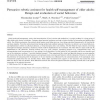Free Online Productivity Tools
i2Speak
i2Symbol
i2OCR
iTex2Img
iWeb2Print
iWeb2Shot
i2Type
iPdf2Split
iPdf2Merge
i2Bopomofo
i2Arabic
i2Style
i2Image
i2PDF
iLatex2Rtf
Sci2ools
IJMMS
2010
2010
Persuasive robotic assistant for health self-management of older adults: Design and evaluation of social behaviors
Daily health self-management, such as the harmonization of food, exercise and medication, is a major problem for a large group of older adults with obesity or diabetics. Computer-based personal assistance can help to behave healthy by persuading and guiding older adults. For effective persuasion, the assistant should express social behaviors (e.g., turn taking, emotional expressions) to be trustworthy and show empathy. From the motivational interviewing method and synthetic assistants’ literature, we derived a set of social behaviors, and implemented a subset in a physical character, a virtual character and a text interface. The first behavior type concerns conversing with high-level dialogue (semantics, intentions), which could be implemented in all 3 assistants. The other behavior types could only be implemented in the characters: showing natural cues (e.g., gaze, posture), expressing emotions (e.g., compassionate face), and accommodating social conversations (e.g., turn taking)....
| Added | 27 Jan 2011 |
| Updated | 27 Jan 2011 |
| Type | Journal |
| Year | 2010 |
| Where | IJMMS |
| Authors | Rosemarijn Looije, Mark A. Neerincx, Fokie Cnossen |
Comments (0)

